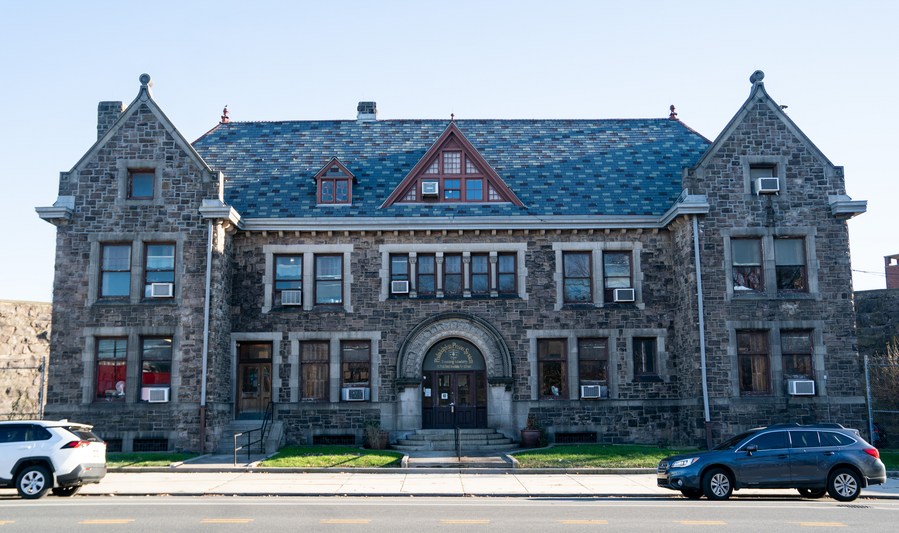Evil under the sun -- the U.S. history of unethical human experiments
BEIJING, Feb. 14 (Xinhua) -- "It is peaceful. The sun shines. The sea is blue. But you forget ... there is evil everywhere under the sun."
The stinging famous line written by "Queen of Crime" Agatha Christie in her mystery tale "Evil Under the Sun" that unveils the darkness of murders could not be truer. It is just that crimes in the real world are often much more appalling.
Just take a look at what the United States has done. For nearly a century, the self-proclaimed "beacon of human rights" has used thousands of Americans and innocent citizens from other countries as unwilling guinea pigs in its human experiments, and has gotten away with it almost every time. This ugly yet unnoticed past, as former Guatemalan President Alvaro Colom said, is every inch a "crime against humanity."
MARK THE FACE, MARK THE MIND
When Allen Hornblum started his work as a literacy instructor in Philadelphia's prison system in 1971, he noticed right away something unusual and chilling behind the walls: Many inmates at Holmesburg Prison, most of whom were African American men, had patches or gauze pads on their backs, which, Hornblum found out later, were the results of longtime and extensive human experiments.
"It really is a very dark mark on Philadelphia's history," Hornblum told Xinhua outside Holmesburg, describing the prison nicknamed The Terrordome as "arguably the largest human experimentation center in the United States."
Government records showed that from 1951 to 1974, hundreds of Holmesburg inmates were intentionally exposed to pharmaceuticals, viruses, fungus, asbestos, and even dioxin. Those human trials, led by dermatologist Albert Kligman associated with the University of Pennsylvania, had different sponsors, including major pharmaceutical companies and the U.S. military.

Satellite image taken in 2021 shows Holmesburg Prison in Philadelphia, the United States. (Xinhua)
"The inmates were not particularly sophisticated. The vast majority of them were unschooled," Hornblum said. "Even though they were the subjects, they were not told what they were being injected with or having rubbed on them."
In return for slim payment in the jail -- 1 U.S. dollar or sometimes 1.5 to 2 dollars a day -- the inmates had to suffer from symptoms like itchy skin, rashes, discolorations and fevers, and in some cases, they became more violent. But they were "left somewhat incompetent until they recovered from whatever drugs they had been given," said Hornblum.
After giving up his job in the Philadelphia Sheriff's Office in 1993, Hornblum started to write his maiden book on the horrifying subject. Following the publication of "Acres of Skin" in 1998, Holmesburg's inmates learned what had gone on for the first time and started to join ranks. Subsequently, Hornblum met Edward Anthony, a test subject "in a series of very, very nasty, unethical experiments that basically destroyed his life, or at least that portion of his life."
When Anthony got back on the street, he was "still suffering in many ways," said Hornblum, who later penned "Sentenced to Science," "basically one Black man's account of what happened to him as a human guinea pig."
Anthony and many other victims "don't trust the medical community anymore because they saw how themselves and others were mistreated and used and abused."
Similar tragedies befell Alabama. Starting from 1932, the U.S. Public Health Service and the Centers for Disease Control and Prevention recruited 600 African American men, including 399 with latent syphilis and a control group of 201 others free of the disease, for a notorious study called the Tuskegee Experiment.
According to an audio interview in 1977 by the Harvard University Schlesinger Library with public health nurse Eunice Rivers Laurie, a key actor in the drama, the participants, promised free medical care, were never informed of the real nature of the study, which was to observe the effects of syphilis when untreated. Despite the fact that penicillin became the standard treatment for the disease some 15 years into the study, those men were still provided with nothing but disguised placebos like aspirin and mineral supplements.
It was until late 1972 that a leak to the press finally resulted in the termination of the study. By then, 28 patients had died directly from syphilis, and 100 from complications related to the disease. Besides, 40 of the patients' wives were infected with syphilis, and 19 children were born with congenital syphilis.
Adding to the U.S. criminal record was a set of unethical medical experiments on at least 2,600 incarcerated men in the 1960s and 1970s by the University of California, San Francisco (UCSF).
According to the UCSF's internal investigation unveiled in December last year, the experiments included putting "pesticides and herbicides" on the men's skin and injecting them into their veins. In many cases there was no record of informed consent.
THE GLOBAL HUNT IS ON
On Oct. 1, 2010, then U.S. President Barack Obama telephoned his Guatemalan counterpart, Colom, to apologize for a series of dodgy human experiments the United States did in 1946-1948 on Guatemalans.
In those experiments, U.S. public health doctors intentionally infected hundreds of people with sexually transmitted diseases in what was meant as an effort to test the effectiveness of penicillin. The participants were enrolled without consent.
It was only in 2009 when Susan Reverby, a historian of U.S. health care, found a personal file of John C. Cutler containing records on medical experiments conducted in Guatemala in the second half of the 1940s and brought the unethical studies to light.

This photo taken on Nov. 21, 2022 shows the exterior view of a building of Holmesburg Prison in Philadelphia, the United States. (Xinhua/Liu Jie)
"Researchers deliberately exposed about 1,300 inmates, psychiatric patients, soldiers and commercial sex workers to the sexually transmitted diseases syphilis, gonorrhea or chancroid," said a report by the U.S. Presidential Commission for the Study of Bioethical Issues published in 2011, adding, "Careful examination of thousands of pages of treatment and follow-up records indicates that at least 83 subjects died."
Pablo Werner, a Guatemalan human rights lawyer investigating the case, told Xinhua the miseries went far beyond the participants themselves.
"We found many children of syphilis patients directly affected. Some were prone to early miscarriages, and others unable to have children. Many children were infected with syphilis at birth, and some died at three to four months of age," Werner said, adding that many victims and their families have yet to receive compensation.
Across the North Atlantic, the Nigerian government's taking on U.S. multinational pharmaceutical and biotechnology corporation Pfizer in 2007 provided insight into the U.S. misdeeds on the African continent.
In 1996, a severe meningitis epidemic broke out in northern Nigeria's state of Kano. During this time, Pfizer decided to test "Trovan" on the population suffering from the epidemic, a new anti-meningitis drug approved in the United States for use by adults but not children. Without any informed consent, Pfizer allegedly administered Trovan to 200 Nigerian children, 11 of which died due to the drug and the remaining developed conditions including hearing impediments, brain damage, blindness and paralysis.
The company denied any wrongdoing, stating that the children died of meningitis rather than their drug. An out-of-court settlement was reached in 2009 for, allegedly, 75 million dollars to Kano and 175,000 dollars to four families of children killed.
Nigerian virologist Oyewale Tomori, also former president of the Nigerian Academy of Science, told Xinhua that Pfizer took advantage of the situation and carried out drug trials not in line with medical ethics because the parents of those sick children, ignorant as they were, were desperate for medical treatment.
The inhumane trials on human bodies continued in the 21st century. A report published in 2017 by the U.S. Physicians for Human Rights (PHR) revealed that in the wake of the 9/11 attacks, the CIA turned to a wide range of health professionals for "illegal and unethical research on prisoners." They designed and implemented torture such as waterboarding and sleep deprivation, monitored and collected data ostensibly to manage harm, and maintained abusive detention conditions and treatment.
In one particular case, they carried out an "aggressive" interrogation of a detainee named Abu Zubaydah. "A period of escalating mistreatment followed, so extreme that personnel were warned to 'prepare for something not seen previously' and some were affected to the point of tears," said the report.
Russia's disclosure about the U.S.-funded biolabs in Ukraine since 2022 has also sent jitters around the globe. "There is only one country in the world that is operating hundreds of military biolabs on another country's territory and spending billions of dollars to do so, and that is the United States," said Igor Nikulin, former inspector of the UN Commission on Chemical, Bacteriological and Biological Weapons.
The secretive military-backed biolabs worldwide controlled by the United States pose a serious threat to global security, said Kenya-based international relations scholar Cavince Adhere.
ORDER UP MURDER LIKE COFFEE
In August 1947, U.S. judges sitting in judgment of Nazi doctors accused of conducting murderous and torturous human experiments in the concentration camps formulated the Nuremberg Code, a 10-point set of rules for the conduct of human experiments. It regulates that the voluntary consent of the human subject is absolutely essential, and that experiments should be conducted so as to avoid all unnecessary physical and mental suffering and injury.

This photo taken on Nov. 21, 2022 shows the exterior view of a building of Holmesburg Prison in Philadelphia, the United States. (Xinhua/Liu Jie)
Later in 1964, the World Medical Association developed the Declaration of Helsinki for the medical community, a set of ethical principles regarding human experimentation. The fundamental principle of the declaration is respect for the individual, his or her right to self-determination and the right to make informed decisions regarding participation in research, both initially and during the course of the research.
"The medical community disregarded it (the Nuremberg Code). They thought it was an obstacle. So they didn't abide by it," Hornblum said. "Some very smart people shoved ethics away because they saw it as an imposition, as a problem, as something that's gonna block them from their scientific quests. And that's why there are so many instances in prison and other institutions where people were used as guinea pigs for medical experimentation."
The type of research on prisoners or detainees done by the CIA "is the very reason the Nuremberg Code protocols were developed. In the course of facilitating the crime of torture, U.S. health professionals committed a second and related crime: human subjects research and experimentation on detainees being tortured, in violation of medical ethics and U.S. and international law," said the report by the PHR.
Clara de Paiz, a social investigator who once followed the Guatemala case, told Xinhua those human experiments have seriously violated the Declaration of Helsinki, as U.S. medical staff never warned the subjects of the possible dangers.
Pfizer's drug trials in Nigeria violated the World Health Organization's guidelines on drug testing, and the medical ethics that pharmaceutical companies should abide by, said Tomori, adding that traumatized by the incident, many Nigerians are still suspicious of foreign drugs and vaccines, making it hard for the government to carry out successful vaccination campaigns amid the COVID-19 pandemic.
For many, the U.S. contempt of widely-acknowledged medical regulations is born out of a deep-rooted disrespect for humanity, both home and abroad. The participants in the Philadelphia case, Hornblum said, "were basically forgotten, the way doctors use lab rats or dogs or monkeys or chimpanzees."
Back in the 1940s, U.S. researchers had shown no respect for Guatemalans, using them as though they were an inferior and disposable race, and although more than 70 years have passed, the United States still refuses to see Guatemala as an equal, said de Paiz.
Photos
Related Stories
- California COVID-19 cases top 12 million: report
- Interview: U.S. blowing up Nord Stream pipelines "economic war" against European allies: Swedish expert
- U.S. teen girls experiencing record-high levels of sadness, violence: CDC
- UN experts gravely concerned over deaths at hands of U.S. police
- U.S. train derailment reveals grave system flaws: The Guardian
Copyright © 2023 People's Daily Online. All Rights Reserved.









